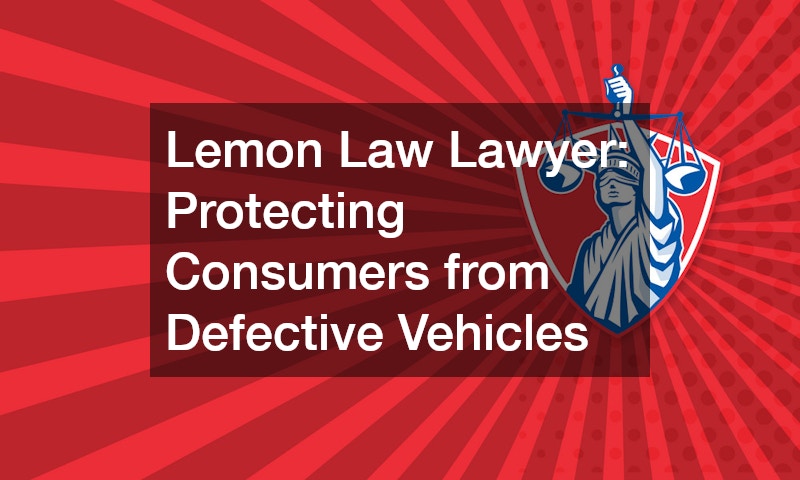Understanding Lemon Law
When consumers purchase a new vehicle, they expect reliability, safety, and performance. Unfortunately, some vehicles come with persistent defects that manufacturers fail to fix—earning them the label of a “lemon.” The lemon law protects consumers in these situations, ensuring that they can seek fair remedies such as a refund or replacement. A lemon law lawyer specializes in advocating for these consumers, guiding them through the complex legal process and ensuring their rights are protected.
Lemon laws exist in all U.S. states, though their details vary.
Generally, these laws cover vehicles—new and, in some states, used—that have significant issues affecting their use, value, or safety. A vehicle may qualify as a lemon if the same defect persists after several repair attempts by an authorized dealer or if it has been out of service for an extended period. Despite differences among jurisdictions, the purpose of lemon laws remains the same: to prevent consumers from bearing the financial burden of defective vehicles.
Because lemon laws are complex, hiring a knowledgeable lawyer is essential. A skilled attorney can determine whether a vehicle qualifies under the law, compile supporting documentation, and negotiate effectively with the manufacturer. They understand consumer protection statutes, court precedents, and procedural requirements—ensuring paperwork is filed correctly and deadlines are met. With legal representation, consumers often achieve faster and more favorable results, avoiding the confusion and pushback that can arise when negotiating on their own.
Lemon law lawyers also play an important educational role. Many car owners are unaware of their rights when they encounter ongoing vehicle defects. By explaining what qualifies as a lemon and how to pursue a claim, these lawyers empower clients to take informed action. Educated consumers can then hold dealerships and manufacturers accountable, helping promote higher standards of transparency and product quality within the auto industry.
The Role of a Lemon Law Lawyer
A lemon law lawyer assists clients through every stage of the defective vehicle claim process. They gather purchase documents, repair records, and correspondence with dealerships to build a strong case. They also communicate directly with manufacturers and dealerships, ensuring that each attempted repair and delay is properly documented. By clearly presenting the extent of the defect and previous repair efforts, the lawyer positions the case for a fair resolution—whether through settlement or litigation.
Negotiating settlements is a key part of the lawyer’s job. Their goal is to secure a favorable outcome—either a vehicle replacement or a refund—for the client. Lawyers use legal evidence, documentation, and documentation to strengthen their arguments. During these discussions, they evaluate each potential settlement, advising clients on which option best fits their circumstances. Transparency is central to the process: attorneys keep clients informed and involved in every major decision. This collaborative approach helps ensure that the outcome properly compensates the consumer for both inconvenience and financial loss.
If negotiations fail, a lemon law lawyer can escalate the matter to court. They prepare by collecting detailed evidence, consulting expert witnesses, and crafting arguments that demonstrate the manufacturer’s failure to meet warranty obligations. Through a firm understanding of courtroom procedures, these lawyers guide clients through each stage—from pretrial motions to final verdicts—while managing expectations around timelines and potential outcomes. Their ultimate goal is to ensure that the manufacturer upholds the law and that the consumer receives a just resolution.
Benefits of Hiring a Lemon Law Lawyer
Hiring a lemon law lawyer provides several key benefits. Most importantly, they offer specialized expertise in this niche area of consumer protection law. Their familiarity with statutes and procedural nuances helps streamline the process, reducing the stress and time consumers would otherwise spend navigating the system alone. They also handle all correspondence with the manufacturer, shielding clients from the frustration of dealing directly with corporate representatives. This professional buffer often leads to smoother communication and faster results.
Another major advantage is that most lemon law lawyers work on a contingency fee basis. This means clients pay no upfront legal fees—the lawyer is only compensated if the case is successful. This structure allows consumers to pursue justice without financial risk, ensuring that even those with limited resources can take action. Contingency arrangements also motivate attorneys to work diligently, since their payment depends on achieving a positive result for their client.
Experienced lemon law lawyers also protect clients from deceptive practices or lowball settlement offers. Manufacturers may attempt to downplay the defect, offer partial reimbursements, or delay communication in hopes of discouraging the consumer. A skilled attorney recognizes these tactics immediately and counters them with evidence and legal precedent. Acting as both advocate and negotiator, the lawyer ensures that clients are treated fairly throughout the process and that the final agreement truly reflects their rights under the law.
Purchasing a defective vehicle can be a stressful and costly experience, but lemon law protections exist to level the playing field between consumers and manufacturers. With the guidance of an experienced lemon law lawyer, car owners can navigate the complex legal process with confidence. These professionals not only advocate for fair compensation but also educate consumers about their rights, strengthening overall accountability within the automotive industry.




